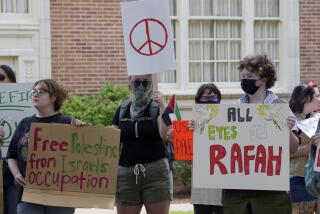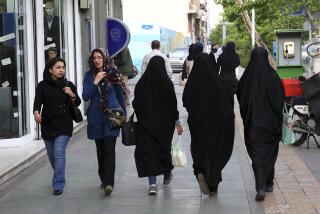Egypt police try to improve image through Facebook
- Share via
Reporting from Cairo — Social media aren’t just for revolutionaries seeking leadership change. The Egyptian police, it seems, want to be friended too.
Facebook and other sites were widely used by anti-government activists who drove Egyptian President Hosni Mubarak from power last week. Now the sites are helping to propel protesters into the streets in several other Middle Eastern countries.
But in Egypt, where law enforcement is often hated and feared, one police officer is hoping Facebook can do for the force’s public image what it did for young protesters, one click of the “Like” button at a time.
“Of course we saw the success of Facebook in the Jan. 25 movement, so we tried Facebook as well to bring the police together,” said Ahmed Ragab, a police major in the Giza area. “The point of the group was to support the spirit of inclusiveness with the police and people and to return the trust and the brotherhood that was lost after Jan. 25.”
On Sunday, the same day police in Cairo took to the streets to demand better pay and portray themselves as victims, Ragab launched the Martyrs Demonstration page to honor police who were killed in the demonstrations, announce coming police protests and drive home the message that officers are Egyptians too.
When Ragab posted his photo on the page, he chose one in plainclothes rather than in uniform.
Though police officers are trying other means to reach out — including marching through Tahrir Square, the heart of the recent uprising, to the shock and sometimes anger of protesters there — Ragab called the website the most important way to connect with people now.
“So for that reason we turned to Facebook to create a solidarity movement and not chaotic protests,” Ragab said during an interview at the Police Club, a trying-to-be-ritzy establishment on the Nile River, restricted to higher-ranking officers only.
The choice of Facebook as their platform was made in part because their message there can reach outside the country’s borders, he said. Police are keenly aware of their poor reputation inside and outside of Egypt and want to fix their image on a global scale.
Ragab believes there was a rather rosy relationship with the people that was fractured during the height of the protests. But distrust of the law runs deep in Egyptian society, long before clashes with police and government supporters left scores of protesters dead and Tahrir Square was transformed from a traffic circle to a symbol of resistance. Regular complaints against the police include being shaken down for bribes and being abused in detainment.
Just as the police protests this week borrowed tactics and chants from the anti-government demonstrators, Ragab’s Facebook page echoes the demonstrators’ efforts in humanizing themselves.
The Martyrs Demonstration page, which at one point Thursday had 353 “likes,” has a flier that shows the faces of seven officers said to have been killed during the protests and asks, If these men didn’t like Egypt, would they have sacrificed their lives?
The group’s description reads, “The police are in service to the people.”
One woman, whose profile picture is of Mubarak, wrote, “May God protect you and oh God, oh God may the Egyptians understand you are Egyptians and our brothers and sisters.”
Most of the comments are positive. Ragab denies removing any negative ones, and there are a few.
“Hahaha, the police are the ones who let the criminals loose on the people,” commenter Ahmed Hosam wrote in response to a woman who said the police protected Egyptians from thugs.
Another man wrote, somewhat cryptically, “God willing he will give success as long as the intention is pure.”
More to Read
Sign up for Essential California
The most important California stories and recommendations in your inbox every morning.
You may occasionally receive promotional content from the Los Angeles Times.














